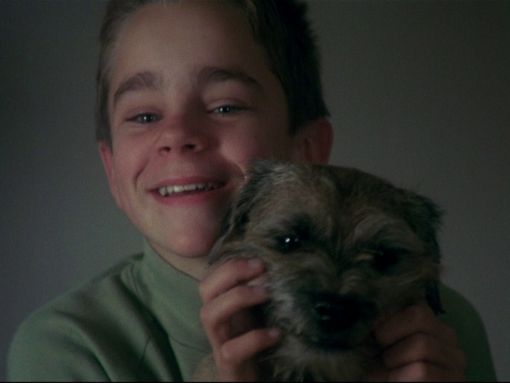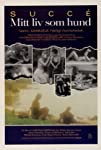Eye For Film >> Movies >> My Life As A Dog (1985) Film Review

A real gem. One of those miraculous films where nothing (almost) seems out of place. Where the tone is simply right all the time. Where each actor, from the old man dying, to the joyful uncle and the ill mother, but above all the incredible child around whom the whole film evolves, gives a magic performance, so natural that never for a second can one remember that there is a camera behind and that one is looking at it comfortably sitting in a darkened room. You are simply taken away into this Swedish countryside, into its summer, buzzing with heat, or into the deep snow of the school term.
The year is 1959. A sputnik has been launched into space with the dog Laika on board. Ingemar, a 10-year-old boy bursting with energy and in love with his own dog can't understand how anyone could send a living creature into orbit, knowing that at some stage it will starve to death. But then, as he says, everything is relative. And yet the thought comes back, every time he looks at the immensity of the sky, filled with its panoply of stars.

There are many other subjects of worry. The main one is his adored mother - father does not exist; for the children, he is somewhere in Africa, picking bananas, but he may also be dead. Sometimes, she has these terrible coughs and turns away from him. If he does something silly, such as wetting his bed because his brother shoots at him with a water pistol to wake him up, or spilling a whole creamy dish on the kitchen floor because of a fight with his brother, she gets into a terrible state, screaming and sobbing and finally collapsing because she knows she cannot cope. When this happens Ingemar hides with his dog under the table, puts his hands over his ears and hums a song of his own to cover the sounds.
One day, during the summer holiday, a neighbour comes to take the boys away. Their mother has to rest. It's only for a little time, he says.
Ingemar is sent to stay with relatives in the country. He is lucky for they are particularly nice people. His uncle works in a glass factory. They blow decanters and other beautiful objects. They live in a house, divided into flats. Underneath is an old man who is bed-ridden. From time to time he knocks on his radiator and the sound travels along the pipes to the upstairs flat. This is the signal for Ingemar to keep him company. Under his pillow is a catalogue for women's underwear, which he gives to the child to read. The idea that the descriptions of corsets and bras represent the summit of eroticism for the old man is delightfully funny.
Ingemar is also a passionate boxer. Of course, it helps to have the Swedish heavyweight champion bear his name! The children have installed a ring in the barn and his adversary is a lovely boy who shows an interest in him, which goes beyond boxing. His breast is strangely burgeoning inro that of a teenage girl. Ingemar helps him put a bandage on it so that he can go on boxing without being laughed at by the other children. It's the only bizarre moment in the film, although Ingemar's reaction is completely natural, as he shies away from embarrassing signs of affection. Later, the oddity of his behaviour will have a simple explanation, although it would be wrong to unveil this here.
Ingemar has a recurrent dream of his mother on the beach, laughing at his jokes, while he jumps on the sand next to her. When the memory becomes too painful, he escapes, or pesters his uncle to fetch his dog, which was put in a kennel at the same time he left home.
Dealing with feelings of innocence, love and abandonment, this magical film is often very funny, but above all profoundly moving without ever falling into sentimentality.
It was filmed in 1985, but could have been made yesterday. Never have I seen a child act as well. The only one I can think of who might compete with Anton Glanzelius is Brigitte Fossey in Jeux Interdits by Marcel Carne, filmed in the late Fifties.
My Life As A Dog is a genuine classic, which will remain forever.
Reviewed on: 08 Jun 2005
















